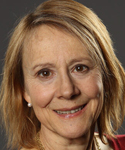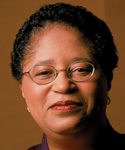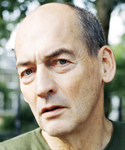Dyson, Jackson, Koolhaas and Venter will also speak at Rice
Chief Justice of the United States John G. Roberts Jr. is one of five highly acclaimed leaders who will participate in Rice University’s Centennial Lecture Series in October. Rice is celebrating its 100th anniversary this year.
The series also will bring to campus international angel investor Esther Dyson, Rensselaer Polytechnic Institute President and physicist Shirley Ann Jackson, Pritzker Prize-winning architect Rem Koolhaas and human genome pioneer J. Craig Venter.
“We are thrilled to have these extraordinary speakers come to our campus to help celebrate our centennial,” Rice President David Leebron said. “In information technology, genetics, energy, architecture and design, and law, these are among the world’s leading visionary thinkers. Our centennial is a time not only to look back, but to look as far as we can into the future and think about how our university will contribute to it. I am especially grateful to the faculty committee which guided the choice of these speakers. They will surely contribute to the exciting and energizing celebration we are anticipating for October.”
All five speakers will give full lectures during their visit to campus, and four of them will also participate in an evening of short talks Oct. 10 from 8 to 10 p.m. (Chief Justice Roberts is unable to participate in the short talks because the Supreme Court will be in session that week.) The lecture series will be held in Autry Court in Tudor Fieldhouse and will be open to the public as well as the Rice community.

Esther Dyson
Dyson will present “Traveling Behind the Scenes” from 1 to 2:15 p.m. Oct. 11. A lifelong self-educator, she invests in and nurtures companies engaged in information technology, private aviation and space travel, health and other areas. A former journalist with Forbes, Dyson has edited the computer industry newsletter Release 1.0 and written columns for the New York Times and Huffington Post. In a New York Times op-ed, Paul Krugman noted that Dyson predicted in 1994 “that the ease with which digital content can be copied and disseminated would eventually force businesses to sell the results of creative activity cheaply, or even give it away.” Dyson considers herself a “fanatic” about transparency; her self-description on Twitter reads, “I occupy Esther Dyson.”

Shirley Ann Jackson
Jackson will present “Valuing Science: Exploring Our Past, Securing Our Future” from 3 to 4:15 p.m. Oct. 11. Described by Time magazine as “perhaps the ultimate role model for women in science” and by the National Science Board as “a national treasure,” Jackson has held senior leadership positions in government, industry, research and academia. She served as chairman of the U.S. Nuclear Regulatory Commission under President Bill Clinton and currently co-chairs the President’s Innovation and Technology Advisory Committee. She was the first black woman to earn a Ph.D. from MIT in nuclear physics and the first black woman elected to the National Academy of Engineering. She has been president of Rensselaer, the country’s oldest technological university, since 1999 and led its transformation with a strategic effort called the Rensselaer Plan.

Rem Koolhaas
Koolhaas will present “Architecture as a Global Practice” from 10 to 11:15 a.m. Oct. 11. He is one of the founders of the Office of Metropolitan Architecture (OMA), a leading international partnership practicing architecture, urbanism and cultural analysis. Koolhaas worked as a journalist and script writer before becoming an architect. A graduate of the Architectural Association in London, he summarized the work of OMA in his 1995 book, “S,M,L,XL,” a novel about architecture. In addition to overseeing OMA’s work in architecture and master planning around the world, Koolhaas co-directs AMO, OMA’s creative think tank, which gets involved with fashion, technology, sustainability and politics. The work of Koolhaas and OMA has received multiple international awards, including the 2000 Pritzker Architecture Prize and the 2010 Golden Lion for Lifetime Achievement.
Chief Justice Roberts’ lecture, “A Conversation with the Chief Justice,” will be held from 3 to 4 p.m. Oct. 17. He received his law degree from Harvard Law School, where he was editor of Harvard Law Review. Chief Justice Roberts has served as special assistant to the attorney general for the U.S. Department of Justice, as associate counsel to President Ronald Reagan and as principal deputy solicitor general for the U.S. Department of Justice. He was appointed to the U.S. Court of Appeals for the District of Columbia Circuit in 2003. President George W. Bush nominated him as chief justice, and he took his seat on the U.S. Supreme Court in 2005.
Venter will present “From Reading to Writing the Genetic Code” from 3 to 4:15 p.m. Oct. 10. Regarded as one of the leading scientists of the 21st century, Venter was among the first to sequence the human genome. With bachelor’s and doctoral degrees from the University of California at San Diego, he is the founder, chairman, and president of the J. Craig Venter Institute, a nonprofit research organization dedicated to human, microbial, plant, synthetic and environmental genomic research and the exploration of social and ethical issues in genomics. The institute created the first self-replicating bacterial cell constructed entirely with synthetic DNA. It also published the first diploid genome of an individual, based on Venter’s own DNA, which has implications for individualized genomic medicine.
A faculty committee selected the speakers for the lecture series.
“The Centennial Lecture Series Committee sought visionaries in their fields as a way of not only honoring Rice’s history but looking ahead to its future,” said Anthony Brandt, Shepherd School of Music associate professor of composition and theory, who co-chaired the committee with Susan McIntosh, professor of anthropology. “We drew on Provost George McLendon’s three initiatives for the university — bioscience and health, energy and the environment, and international strategy — along with the creative arts.”
McIntosh noted that the search for speakers began in the summer of 2010 by soliciting suggestions from the Rice community. “We wanted people of the absolutely highest caliber – speakers you would travel to hear if you’re an alum,” she said. “Having four short talks in a row in one evening will make this a powerhouse event that will be enormously memorable.”
Editor’s note (posted Oct. 9): Registration for the Centennial Lecture Series is now closed. More information on Rice University’s Centennial Celebration (Oct. 10-14) can be found at centennial.rice.edu.




Wow! This is very exciting.